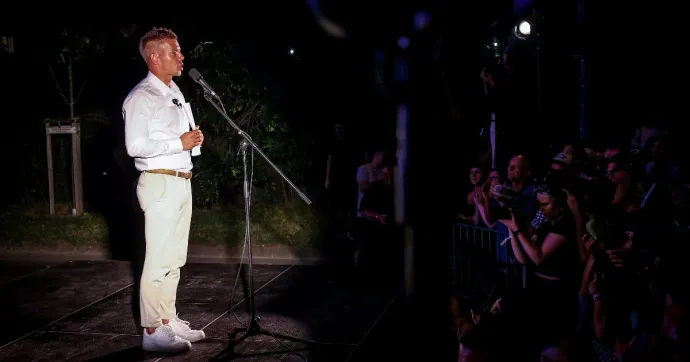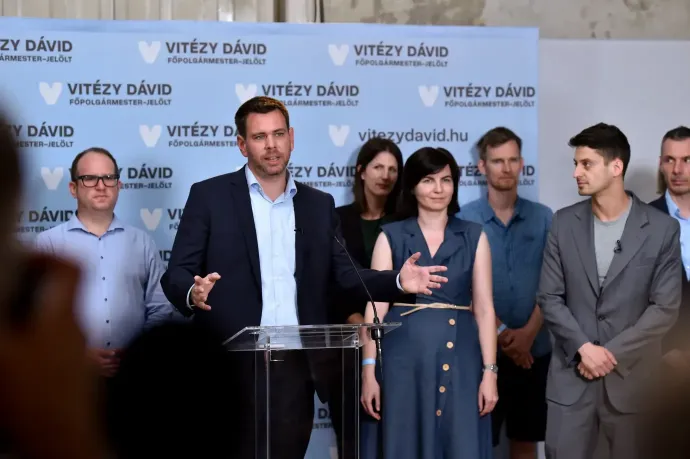Speaking at Telex's live coverage programme after the first results of the EP and municipal elections started coming in on Sunday evening, political analyst László Kéri said that it is obvious that "a brand new phase is beginning in Hungarian political life”. Political newcomer Péter Magyar's Tisza Party has seriously shaken up the stagnant waters of Hungarian politics we've witnessed in the past several elections, where Fidesz-KDNP wins with a landslide and the opposition parties lag behind with a fraction of the votes the governing coalition had won.
With 98.48 percent of the votes processed, Hungary's 21 seats in the EP stand to be distributed as follows:
- Fidesz-KDNP: 44.52 percent – 11 seats
- Tisza Party: 29.74 percent – 7 seats
- DK-MSZP-Párbeszéd: 8.14 percent – 2 seats
- Mi Hazánk: 6.75 percent – 1 seat
Although they still won, and did so convincingly, this is Fidesz's worst EP election result ever. In the last 20 years it only happened once that they finished below 50 percent: in 2004, while still in opposition, they achieved 47.4 percent.
In spite of this, in his victory speech given before the final results were in, PM Viktor Orbán said that
“there were two elections held today, and we've won them both”.
According to him, “Hungarians have confirmed the government's pro-peace politics and have authorized us to keep Hungary out of the war.” Orbán said that “the Hungarian people have made it clear: those who turn against their homeland in Brussels will be punished” and concluded his speech with: “stop migration, stop gender, stop war, stop Brussels.”
Magyar: This is the Waterloo of Orbán's power factory
When more than 70 percent of the votes had been counted, and it was clear that the Tisza Party will have 7 MEPs for sure, Péter Magyar spoke to those gathered at his party's reception:
"This is the beginning of the end, the Waterloo of Orbán's power factory. What happened is a political earthquake. Today is proof that it is possible to do politics for the good of the Hungarian people."
Earlier in the evening, at the press conference he had held after the polling stations closed, Magyar, whose party was founded as recently as mid-April, also said that whether someone has 11 or 12 MEPs is of little importance. The only thing that matters is that "on 9 June 2024, Hungarian politics and the position of NER will have changed."

"We will have a programme that will lead this country out of the quagmire into which Gyurcsány, Orbán and his family have led it with the help of propaganda," Magyar said, adding that he believes the Orbán family's wealth should be closely examined by investigative journalists.
Far right Mi Hazánk gets to send one MEP to the European Parliament, which the party's leader, László Toroczkai described as "a great accomplishment" and he added that they would like to form a new party family with Germany's far-right AfD.
Those who didn't do as well as last time
Momentum, which had two MEPs in the European Parliament in the previous term, didn't manage to repeat this result. Once this became obvious, the party's leader, Anna Donáth said: ""During my seven-year political career, I have shown that I am not afraid to take political responsibility for things that have political consequences, and I will do so again. At this point, even if I wanted to, I wouldn't be able to say any more though, because that's not where we are at the moment, but we will talk it through."
Demokratikus Koalíció (DK), which won 4 seats in the EP at the last elections, teamed up with MSZP and Párbeszéd (Dialogue) this time, but this did not prove to be a winning strategy, as their coalition was only able to win 2 seats. Commenting on the result, the leader of their list, Klára Dobrev said: “We believed that the politics we represent will be able to convince more voters”. According to her, their task now is to convince as many people as possible that "Hungary will only have a worthwhile, decent prosperity in the midst of a strong Europe", because if "Europe weakens, Hungary will be ruined".
A neck to neck race for leading the capital
Following the last-minute withdrawal of Fidesz' Alexandra Szentkirályi on Friday, the race for the privilege of leading the Hungarian capital ended up being a neck-to-neck one between incumbent mayor, Gergely Karácsony, and his main challenger, Dávid Vitézy, whom Szentkirályi had endorsed.

In the end, Karácsony won by a margin of 324 votes, but since the race was so close, Vitézy announced they would request a recount.
In the early hours of the morning Gergely Karácsony addressed those gathered at the park in front of City Hall: "I know that it's not entirely over yet, but I believe that Budapest will remain a free and solidary city". He said that today's election shows that people no longer want to live in Orbánistan, but that a new era is beginning on the political side critical of the government.
Leader of Two-tailed Dog Party elected mayor in Budapest's 12th district
One definite surprise of the municipal elections is that Gergely Kovács, one of the leaders the Hungarian Two-tailed Dog Party, which started as a joke party, will be the next mayor of Budapest's 12th district.
The district has been a strong right-wing bastion since the mid-1990s, and Fidesz has been consistently in charge of the district both at mayoral and council level since 1998.
Fidesz's Zoltán Pokorni has been the mayor there since 2006, but he has decided not to stand for re-election this year, which opened up a considerable opportunity before the opposition to win the mayor's seat from Fidesz.
Kovács, who had already been a member of the local council in the previous term, likely convinced voters that he would be worth voting for by being very active on several issues related to the district and actively communicated them to the public as well.
Record turnout
Hungarians voted in record numbers in Sunday's EP and municipal elections. By 6.30 pm, half an hour before polling stations closed, more than half of the electorate, 56,09 percent had already cast their vote. By comparison, in 2006, which saw the highest turnout at municipal elections so far, the total turnout at the end of the day was 53,12 percent while the highest voter participation in the EP elections before this year was also that same year, with 43,48 percent of the electorate participating.
The difference, however, compared to previous elections is that both elections showed marked regional differences in terms of turnout. While this time the EP elections were more popular among people living in bigger towns, the municipal elections were more popular among people living in smaller municipalities.
When broken down according to the size of municipalities, the change in this year's participation numbers shows a much more balanced pattern. Compared to previous elections, participation has increased considerably more in medium-sized towns and bigger villages than it did in smaller municipalities or in the capital.
Fidesz's mobilization efforts and Tisza Party's intensive, cross-country campaign seem to be the most significant factors which have contributed to this according to analysts Tamás Kovalcsik and Mátyás Bódi.
According to Júlia Lakatos, Strategic Director of Méltányosság Centre for Political Analysis, who spoke at Telex’s live coverage of the elections, the high turnout may be explained by the fact that international and EU issues have infiltrated domestic public life and the municipal elections as well.
"The stakes of what we are voting on today have increased", she said.
Political analyst László Kéri said that one of the reasons why so many went to the polls was the fact that public life had become busy and eventful over the past two or three months. He also reminded viewers that this was the first time that local and European elections had been held on the same day in Hungary.
For more quick, accurate and impartial news from and about Hungary, subscribe to the Telex English newsletter!